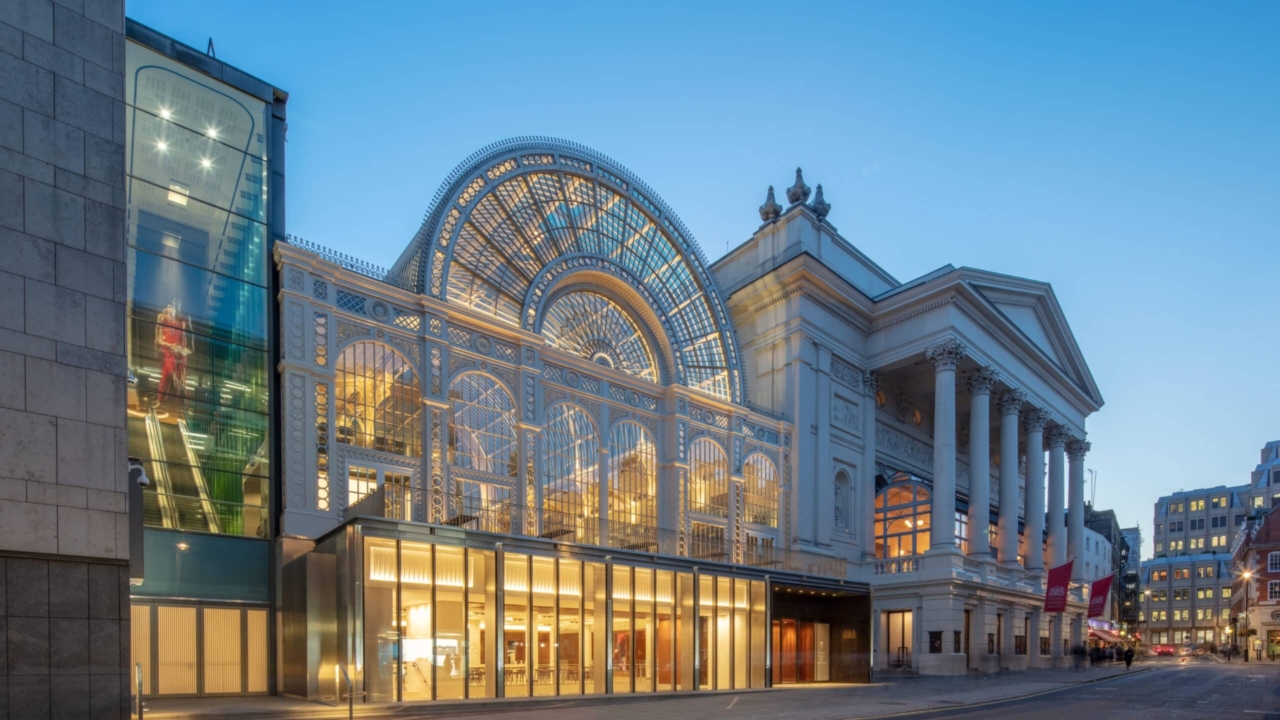- Posted on August 21st, 2025
Story of Change: Royal Opera House

Royal Opera House’s Journey Toward Energy Efficiency and Net Zero Carbon Emissions
The Royal Opera House (ROH), a historic cultural institution based in Covent Garden, London, with additional facilities in Aberdare, Wales, and Thurrock, has been actively pursuing sustainability in recent years. With a goal to achieve net zero emissions for Scopes 1 and 2 by 2035, ROH is navigating the complexities of decarbonising a large, historic building while managing a 10-year renovation project.
This case study examines ROH’s efforts over the past 18 months, supported by its participation in Art Council England’s Transforming Energy programme for Capital Investment Ready to prepare for decarbonisation.
Background
ROH operates a sprawling estate that includes its iconic Covent Garden theatre, a warehouse in Aberdare for storing sets and scenery, and workshops in Thurrock for production. The historic nature of the Covent Garden building, reliant on gas boilers for heating, combined with an ongoing decade-long renovation, complicates its sustainability efforts.
ROH has accelerated its decarbonisation journey, aided by the Transforming Energy Programme to access strategic guidance, funding insights, and peer connections. This support has been instrumental in driving progress and maintaining momentum.
Key Initiatives in Recent Years
ROH has implemented several practical measures to reduce its environmental footprint while laying the groundwork for long-term decarbonisation:
1. Boiler Efficiency Improvements
Recognising that replacing its gas boilers is a long-term project, ROH prepared a case for installing more efficient burners. Funding was secured, and the upgrade is scheduled for completion by September 2025. This interim solution aims to lower gas consumption and emissions while the boilers remain in use.
2. Solar Power Advancement
ROH has identified opportunities for installing solar energy panels. This initiative reflects an understanding that early adoption of renewables can yield immediate energy savings and carbon reductions, positioning the organisation to benefit sooner rather than later.
3. Exploration of Heat Pump Systems
Feasibility studies have been conducted to replace gas boilers with heat pumps, including air-source and water-source cascade systems. These studies represent a forward-thinking approach to electrification, though decision-making has been paused to evaluate a potential connection to a district heat network.
4. Preparing for Funding Opportunities
The organisation has focused on gathering specialist expertise, preparing board presentations setting out the business case for investment, and ensuring readiness for future funding cycles.
Challenges Faced
ROH’s sustainability journey has not been without obstacles:
- Historic Building Constraints: The Covent Garden site’s listed status and reliance on gas boilers complicate decarbonisation efforts, requiring careful planning and infrastructure upgrades over a 10-year timeline.
- District Heat Network Delays: Exploring a connection to a district heat network has slowed progress, as ROH awaits better data and decision-making from external partners. This has created uncertainty about whether to proceed with its own heat pump system or integrate with the network later.
- Organisational Scale: As a large institution, decision-making and implementation take time, causing ROH to lag slightly behind its desired pace.
To address these challenges, ROH has leveraged programme support to refine its approach, improve preparation, and build connections with peers, whose ideas have been helping to informing its strategies.
Outcomes and Strategic Advancements
ROH’s efforts have yielded tangible progress and a stronger foundation for future sustainability:
- Efficiency Gains: The upcoming boiler burner upgrade will reduce gas usage, with anticipated savings reflected in lower energy figures post-September 2025.
- Strategic Preparedness: The programme’s one-to-one coaching and cohort discussions have equipped ROH with the tools to package data effectively, engage specialists, and align projects with funding opportunities.
- Collaborative Learning: Connections with other organisations have fostered idea-sharing, enabling ROH to adopt progressive solutions and accelerate its plans.
- Momentum: Despite initial setbacks, the past 18 months have seen rapid movement in the right direction, with solar and boiler projects advancing significantly.
Future Plans
ROH is focused on several key actions to maintain its trajectory toward net zero by 2035:
- Complete the boiler burner upgrade by September 2025.
- Rapidly implement solar power to maximise renewable energy benefits.
- Decide by the end of 2025 whether to install its own heat pump system or connect to the district heat network, balancing investment, environmental impact, and long-term costs.
- Continue gathering data and refining strategies to ensure readiness for funding opportunities.
Conclusion
The Royal Opera House’s recent journey to reduce energy and carbon emissions reflects a blend of ambition and pragmatism. With programme support, the organisation has enhanced its strategic planning, secured funding for boiler upgrades, and advanced solar and heat pump initiatives. As ROH works toward its 2035 net zero target, its proactive approach and growing network of insights position it as a leader among cultural institutions striving for sustainability amidst operational and historical constraints.
